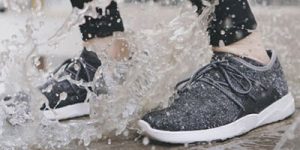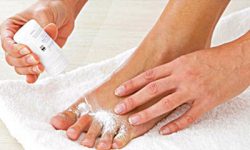Dampness is the breeding ground for fungus, and the monsoon season provides a perfect setting for the growth and increase of fungi-based infections, of which Athlete’s Foot, Jock Itch, Diaper Rash and Ringworm are the most common.
Athlete’s Foot is medically called tinea pedis and has nothing to do with being an athlete. The infection shows up as a white scaly rash between the toes that becomes itchy over time. Rubbing the area gives momentary relief, but later progresses into a discomfiting burning sensation.
Jock Itch is medically called tinea cruris and usually affects the inner fold of the thigh that comes in contact with underwear where sweat accumulates. It forms red rash and irritation, and an urge to itch.
Diaper Rash is a red skin inflammation that affects infants when their wet nappies are not changed to dry ones regularly.
Ringworm is medically called dermatophytosis and is not caused by a worm. The infection looks like a curled-up worm, and hence the name.
The following tips help prevent fungal infections during the monsoon:
Cleanliness is key for both preventing and treating fungal infections.
Since fungal infections move through contact, it is imperative to keep the home and surroundings clean and tidy. Within the house, keeping the bathrooms clean and dry, wiping down kitchen counters and regularly emptying the trash are important. Outside, it is necessary to sweep and dispose off dust, remove stagnant water and keep plants and pets clean.
Personal Hygiene like bathing and washing your hands regularly.
Bathing twice a day is highly recommended by the medical fraternity. Hands should be washed frequently with soap and water. A generous amount of hand sanitizer is mandatory every time the door or a surface that others also access, are used.
Thorough towel-drying after a shower.
Fungus thrives on moisture, and hence it is very important to take a good wipe-down after a bath, especially along the folds of the knees, elbows, neck, arms, fingers and toes.
Changing baby diapers regularly.
Infants and toddlers are totally helpless and need to be given utmost priority. Their diapers and clothing should be frequently checked - especially for wetness, and changed, after giving them a wet and dry sponge and dusting them with baby powder.
Non-sharing of personal items like towels, clothes, combs, socks and shoes.
Sharing of personal belongings is generally not a good habit, and people with a weak immune system or prone to fungal infections should never indulge in it. Personal items like clothes and towels are the closest to the body, carrying fungi to those who come in contact with them.
Changing whole set of clothing every day.
Just like it is mandatory to take a shower every day, it is also mandatory to never wear the previous day’s clothes. Instead, they should be washed clean and preferably sun-dried to get rid of germs.
Wearing loose and comfortable clothes.
Tight fitting clothes trap moisture and attract fungus. On the other hand, when they are airy and comfortable, they dry out sweat faster.
Wearing open-toe shoes / sandals.
Open-toe shoes and sandals also get wet during the monsoon, but rarely retain water like closed shoes that get soaking, soggy and smelly till removed.

Going barefoot at home.
This is the most comfortable way of hanging around at home for Indians, as barefoot walking promotes overall wellbeing and immunity. It also keeps the feet exposed, airy and free of germs.
Using anti-fungal powder.
Pedestrians and two wheelers bear the brunt of the monsoon that leaves behind pools of stagnant and mostly dirty water, resulting in Athlete’s Foot. Drying the feet as soon as possible and applying anti-fungal powder immediately, greatly reduces the soreness and pain.
Reducing weight
People with weight issues are more susceptible to fungal infections due to excessive body flab, as overlapping skin holds moisture longer. A disciplined and consistent schedule of walking and exercising takes care of body fat and reduces weight.
Eating nutritious food.
A balanced nutritious diet consisting mainly of vegetables, fruits, grains and pulses reduces vulnerability to disease and sustains a healthy lifestyle.


